#confederate spring
Explore tagged Tumblr posts
Text
Cemeteries: A Surprising Source of Beauty and Peace
It may be a cemetery, but it’s still beautiful. Sunday. A day off. A lazy day. And a day off from Storyteller. Lucky us. I’ll see you tomorrow, Monday.
#Art#Atlanta#backlight#Cemetery#Color#Confederate#Early Morning#Georgia#Nature#Photography#Post Production#Ray Laskowitz#Season#Spring#Union
0 notes
Note
Hi there! Could you write something about jasper and a hippie partner? Reader was transformed in the late 60s, early 70s and is free spirited and playful, maybe always making fun and joking around about him being an old military, calling him "major" in a teasing tone and rolling eyes when Jasper acts too proper (my headcanon is that Jasper was a traitor of the south, he was a confederate major and all but the reason why he is so proud of it is because he was actually helping the north. It's the only way that backstory makes sense for the the freaking empath of the family) . Or openly talking about how he went to festivals like Woodstock and had fun in every way possible, dancing in the rain, having sex and doing drugs to Carlisle and Esme's ( and Edward's) not so slight horror

Flower Child and The Major
pairing: jasper whitlock x male reader tags: comedic elements, Emmett is a bro, Edward needs to let loose, do you feel how much I love this request, Esme is supportive because she's a goat, carlisle not so much
You stretched leisurely, lounging across the couch with your feet carelessly kicked over the armrest, humming "White Rabbit" by Jefferson Airplane. Your vibrant floral-patterned shirt hung open, revealing a swirl of beads and necklaces glittering against your chest. "Hey, did I ever tell you guys about that one time at Woodstock?" you began casually, eyes sparkling with mischief as Edward visibly tensed from his seat at the piano.
Edward groaned deeply, dropping his head into his hands. "Repeatedly. Honestly, Y/N, I could live without knowing exactly how many illegal substances you consumed—or people you were involved with."
"Oh, lighten up, Eddie," Emmett chuckled from the armchair, tossing a throw pillow at Edward’s head. "I love these stories. It’s like history class—but actually interesting."
Carlisle, standing gracefully near the fireplace, cast Emmett a mildly disapproving look. "Perhaps some of Y/N’s tales could remain private?"
Esme merely chuckled softly from beside him, fondly shaking her head. "I’ve long given up on censoring him. He’s a free spirit."
"See? Mama Bear gets it," you said smugly, blowing Esme an exaggerated kiss, making her laugh quietly into her palm.
Edward huffed irritably, shooting Emmett a glare. "Do you always have to encourage him?"
"Of course!" Emmett grinned, folding his arms behind his head, utterly unrepentant. "If he stops telling stories, how will I find out if Hendrix was really as talented off-stage?"
Edward gagged theatrically. "Please. Spare me."
On cue, Jasper entered the room, immediately sensing the whirlpool of chaotic emotions and visibly hesitating at the threshold. His golden eyes settled on you, a perfect blend of affection and well-practiced irritation.
"Ah! Major Whitlock!" you declared dramatically, springing upright and giving him a mock salute. "Reporting for duty, sir! Awaiting today's lesson in etiquette and how to properly starch one's uniform!"
Jasper exhaled deeply, eyes fluttering shut for a moment. "Must you always?"
"Always," you confirmed brightly, crossing the room with exaggerated, swaying steps before halting directly before him. You looped your fingers casually through his belt loops, tugging him closer. "Come on, Major, you know you secretly love when I tease you."
A faint smile tugged at Jasper’s lips, betraying him completely. "I wouldn't exactly call it love."
Edward sighed loudly, rolling his eyes. "He would. Trust me."
You smirked victoriously at Edward before turning your attention back to Jasper, leaning in conspiratorially. "Besides, we all know your big secret now."
Jasper’s eyes narrowed suspiciously, a slight smirk on his lips. "Which one is that, darlin'?"
"Oh, please," Emmett scoffed loudly. "Like there's more than one secret worth talking about?"
"You know," you drawled teasingly, "the one where our fearsome Confederate major was actually a double-agent working for the North. It explains a lot, actually—no way someone as emotionally sensitive as you could stomach working for those Southern losers."
Jasper’s expression softened despite his attempts at maintaining a stern façade. "It was purely strategic."
"Sure, Major Softie," you teased, sliding your arms around his neck and gently playing with his blonde curls. "I bet you were the cutest little spy."
"Hardly ‘cute,’" Jasper argued mildly, but his hands automatically settled possessively on your hips, clearly betraying his words.
Edward rubbed his temples, groaning. "Must you two flirt so openly? It’s exhausting."
"Almost as exhausting as Y/N’s Woodstock saga," Carlisle mused with a slight twitch of his lips.
You laughed aloud, squeezing Jasper gently. "I still haven’t finished that story, actually—did you guys know I had exactly twenty-seven different partners at Woodstock? And that’s just counting the ones I clearly remember. Those orgies got a little heated, especially when Hendrix—"
"Y/N!" Edward practically shrieked, covering his ears. "Have mercy!"
Emmett, meanwhile, erupted into hysterical laughter, banging his fist against the armchair. "Holy shit! I was joking about Hendrix—but now I’m invested. Spill!"
Carlisle pressed two fingers delicately to his temple, taking a deep breath. "Y/N, while your openness is admirable—"
Esme patted his arm gently, trying not to laugh. "I'm not sure admirable is quite the right word, dear."
"Perhaps certain details could be left to the imagination?" Carlisle finished, ever diplomatic.
You pouted playfully, leaning dramatically against Jasper. "See what I have to deal with, Major? They don’t appreciate my historical accuracy."
Jasper chuckled lightly, pressing a kiss to your forehead with resigned affection. "Truly tragic, darlin'. How will the family survive without vivid recollections of your youthful escapades?"
"Thank you," Edward groaned sarcastically. "At least one person understands."
You tilted your head up at Jasper mischievously, eyes glinting. "So, Major, wanna go frolic barefoot under the stars and scandalize these repressed individuals some more?"
Jasper shook his head slowly, but the smile he gave you was undeniably warm. "I'm fairly certain you've scandalized them enough already."
"Impossible," Emmett scoffed, now lounging upside-down in his chair. "I'm practically scandal-proof."
"Challenge accepted," you laughed, tugging Jasper gently toward the door. "Later, folks!"
Edward sighed deeply, mumbling into his palms. "Finally, some peace."
Emmett snorted, throwing a cushion at Edward again. "Dude, peace left the room the second Y/N walked in."
You smiled wickedly, guiding Jasper outside into the cool night air. Once the door shut behind you, Jasper visibly relaxed, his shoulders loosening. "You truly live to torment Edward, don't you?" he asked softly, amusement in his voice.
"Edward makes it too easy," you shrugged playfully, pulling Jasper close beneath the starry sky. "Besides, admit it, Major—you love my wild stories."
Jasper hummed quietly, gently pressing your foreheads together. "They are somewhat charming, despite my better judgment."
You grinned triumphantly, tugging him toward the tree line. "Come on, soldier-boy. Let's scandalize the forest wildlife. I'll tell you all about Janis Joplin and the marshmallow incident."
Jasper let out a rare, genuine laugh, fingers intertwining gently with yours as he let you lead him deeper into the woods. "You’re impossible," he murmured fondly.
"Maybe," you conceded cheerfully, squeezing his hand. "But I'm your impossible hippie, Major."
"That," Jasper agreed quietly, pressing a gentle kiss to your knuckles, "is something I will never deny."
#x male reader#male reader#the twilight saga#the twilight series#twilight fandom#twilight#bella swan#charlie swan#twilight saga#edward cullen#twilight fanfiction#the cullens#jacob black#alice cullen#emmett cullen#rosalie twilight#rosalie hale#rosalie cullen#carlisle cullen#esme cullen#jasper whitlock#jasper hale#jasper whitlock x male reader#jasper cullen#forks high school#forks washington#the volturi#aro volturi#caius volturi#male reader insert
305 notes
·
View notes
Photo

Mark Twain
Mark Twain is the pen name of Samuel Langhorne Clemens (1835-1910), an American humorist, journalist, lecturer, and novelist. He was the voice of his generation and one of the most celebrated authors of the late 19th century, writing some of America's best-known and most memorable works of literature: The Adventures of Tom Sawyer, Life on the Mississippi, and The Adventures of Huckleberry Finn.
Through these and other works, he had a profound effect on the development of writing in America, influencing numerous authors of the 20th century, such as Ernest Hemingway (1899-1961). With a career that spanned over four decades, Twain shaped the world's view of America. His rich sense of humor was evident in both his novels and lectures, but Twain's biographer Albert Bigelow Paine believed that he was more than a humorist; he was a philosopher, a prophet, and a humanitarian.
Early Career
Samuel Langhorne Clemens was born in Florida, Missouri, on 30 November 1835. His father, John Marshall Clemens, was educated as a lawyer but chose instead to become a merchant, albeit not a very successful one. In 1839, when Twain was four, his father moved the family to Hannibal, Missouri, a small town along the Mississippi River. In Hannibal, John Marshall returned to the practice of the law, eventually being elected justice of the peace. When he died in 1847, leaving the family in debt, Twain was forced to quit school; he was not quite twelve. Twain, like his older brother Orion before him, was apprenticed to a local printer. When Orion bought a small newspaper, the Hannibal Journal, Twain joined him as a typesetter. The newspaper was operated out of the family's basement. On the days when Orion was absent from the paper, Twain would write small parodies about local characters and conditions, and circulation increased.
In 1853, at the age of 18, Twain left home, working as an itinerant printer in St. Louis, New York, and Philadelphia. By the time he returned from the East, Orion had moved the family to Keokuk, Iowa. Twain would remain in Keokuk with Orion until 1857 when he decided to go to Brazil and the Amazon River. He began the long journey at Cincinnati, working as a printer, until spring. Aboard the Paul Jones, headed to New Orleans, he met a riverboat pilot named Horace Bixby, and after a lengthy conversation, decided to forego the Amazon and become a riverboat pilot. 18 months later, he was considered one the best and most careful on the Mississippi, but, with the outbreak of the Civil War in 1861, the Confederates blockaded the river, stopping all river traffic.
Following a short two-week stint in the Confederate Army, Twain traveled west by stagecoach, hoping to become rich in the silver mines of Nevada. Orion, who had a federal appointment in the Nevada Territory as secretary to the governor, went with him. But with little success as either a miner or prospector, Twain used his free time to contribute short articles to the Territorial Enterprise, a Virginia City, Nevada newspaper owned by John Goodman. It was there that he began to use the name Mark Twain, a river term for two fathoms of water. His new name and humorous articles made him famous along the Pacific Slope. Recognizing his talent, Goodman offered Twain the job as editor of the Enterprise at 25 dollars a week. After two years in Virginia City, he moved to San Francisco where he worked for the Morning Call while contributing to the Golden Era and The Californian.
Continue reading...
54 notes
·
View notes
Text
This is a big deal. No, $48,692.05 is in no way, shape or form a fair price for the many thousands of acres of traditional Chinook land that were never ceded but were taken by settlers anyway. However, the fact that this funding from the 1970 Indian Claims Commission settlement is being released to the tribe is the strongest move toward regaining recognition in years.
As a bit of background, the Chinook Indian Nation are some of the descendants of many indigenous communities who have lived in the Columbia-Pacific region and along the Columbia to the modern-day Dalles since time immemorial. They saw the arrival of the Lewis & Clark party to the Pacific Ocean in 1805, but shortly thereafter were devastated by waves of diseases like malaria and smallpox. The survivors signed a treaty to give up most of their land in 1851, but it was never ratified by the United States government. While some Chinookan people are currently part of federally recognized tribes such as the Yakama Nation, the Confederated Tribes of the Warm Springs Reservation, and the Confederated Tribes of the Grand Ronde Reservation, the Chinook Indian Nation--comprised of the Lower Chinook, Clatsop, Cathlamet, Willapa, and Wahkiakum--have remained largely unrecognized.
That changed briefly in 2001. On January 3 of that year, the Department of the Interior under the Clinton administration formally recognized the Chinook Indian Nation. In July 2002, the Bush administration revoked the federal recognition after complaints from the Quinault Indian Nation, as the Chinook would have had access to certain areas of what is now the Quinault reservation. This meant that the Chinook, once again, were denied funding and other resources given to federally recognized tribes, to include crucial healthcare funding during the COVID-19 pandemic.
The Chinook Indian Nation has been fighting legal battles to regain federal recognition ever since the revocation. The funding released to them in this month's court decision doesn't make them federally recognized, but it is a show of legitimacy in a tangled, opaque system that indigenous people across the United States have had to contend with for many decades. Here's hoping this is a crack in the wall keeping the Chinook from recognition, and that they get more good news soon.
#Chinook Indian Nation#Chinook#Chinookan people#indigenous people#indigenous Americans#indigenous rights#landback#federal recognition#Bureau of Indian Affairs#Native American#Native American rights#civil rights#United States
332 notes
·
View notes
Text










Spring planting, if a little late!
Two autumn ferns did not survive the winter in the front brick box, so I replaced those and added red geraniums and kalanchoe to the spaces between. I keep meaning to plant more perennials here and yet keep buying annuals, go figure.
In the back box, the fig tree has now fully overgrown the left side and I need to move the hostas to the front. In the meantime, the yellow azalea and last year's rosemary plant have gone off to the races. This summer, I leaned into the red theme and planted red celosia, coleus, and some super cheap petunias that I honestly probably didn't get deep enough into actual soil and will need to replace within a month, haha.
At the end of the driveway I decided to do red dahlias and a hibiscus I thought was white, but is quite clearly flowering pink. I love dahlias for how rarely I plant them, so hopefully these will do okay.
The confederate jasmine I planted a few years back is officially established and absolutely thriving here. The honeysuckle I planted at the same time in the left corner looks horrific, so I'm going to stop trying to save it and let the jasmine just take over. It's flowering right now and the smell is utterly heavenly every time I get out of the car.
30 notes
·
View notes
Note
I think Arthur’s origins are just soooo interesting! Especially his mother’s ties to the land - and then passing along to him and his brothers. I wonder if Arthur was a surprise to her? She already had 3 children in that time, what could another mean for her? What would raising 4 immortal children be like whilst also fending off invaders?
The usual caveat when I'm this far back into history and have to use archaeology and just general story telling to fill in detail: this is not a history book but perhaps just better informed than average historical fantasy.
I think Arthur was a surprise! And he’s a very welcome one at first. Her first three children are columns holding up her power. Brigantia was either a confederation of tribes united under a more powerful ruler or a series of clans and septs that just spread really far and got really important with an unusual amount of centralization by the time of the Romans. We’re not exactly sure. But, the Celts both on the continent and in Britain and Ireland had a very long tradition of hostage taking as political control. Brigantia’s hold on eastern Ireland, southern Scotland, and a nebulous area of England and Wales could have been very artificial and based upon holding her children. And hostage taking need not have been the only form of this purposeful political organization of their family life. Welsh, Scottish and especially Irish writings detail fosterage to raise children in other’s households as a way to create otherwise very rare political stability amongst the numerous tribes and petty kingdoms that otherwise defined political life in Iron Age Europe.
When Arthur first comes into being, she could have easily interpreted his existence as a sign she would soon be able to exert more power and create more social control over the more fertile parts of the island she can feel. Perhaps the Roman conquest of Gaul and the subsequent refugees will destabilize Britain just enough for her to campaign into the south and bring more land into Brigantia. She’s probably having a torrid affair with her neighbors in Yorkshire when the Parisii appeared and have links to the same culture that will give Paris its name. We don’t know how accurate the Roman accusations of how the Iron Age Britons practiced human sacrifice actually were but nonetheless, sacrifice and worship is powerful and there are many more people in the south who’s belief and blood could flow into her as power. The channel protects her southern neighbors and Rome was defeated by the those same neighbors the one time they crossed. And she is far more fearsome than they are, surely.
Her three eldest children aren’t entirely sure what their original relationship to her may have been but its also not something that bothers them overly much. Mother was a Celt at least by the end of her life, they speak Celtic languages. The mechanics are complicated but the results, at least to them, were not. Brighid especially had more of a mentor/menteé relationship with Eirian but she has no real issue with it being a mother/daughter bond. Eirian could have just been young enough with her first child that they had a more equal dynamic. But regardless of the specific circumstance with she acquired her first three children, they were very purposeful acquisitions. The ancient world understood everything to have a spirit. In her mind it would make more sense to have a child for every field and tree and spring and tribe but I’ve gotta limit characters somewhere so its usually just easier to write leaving large gaps where the historical accuracy could actually be lmao.
At the advent of the Roman invasion, they are a family of the same structure as are found in a wide range of ritual deposits that contain human remains and I’ve kind of borrowed from the concept. We don’t know what this significance was to the people who practiced the religions that deposited these bodies and bones but there seems to have been some relationship to fertility. The pattern seems to be one older adult, one young adult, an adolescent, a child and an infant.
One older adult: Eirian has been chilling since the Bronze age and might have initially made a solid base for herself as the primary tin dealer on the island. One younger adult: Brighid is nearly grown in the 1st century as she pops up around when the Celtic cultures of Iron Age Ireland form as La Tène culture explodes into importance. One adolescent: Alasdair is 12-13 and the ancient version of a lego kid as dry stone building and new technology seem to coincide with La Tène culture as well but with somewhat later adoption of bronze and iron and the curving art so he gets a date a little more in line with the Pictish art style coming into being. One child: Rhys appears about 5-6. He comes into being as a geographic distinction centered around the mountains between Wales and the rest of the country that to develop some kind of distinction in the material culture. One infant: Arthur is born just before the Roman invasion, as a new identity culture in Britain seems to form around new developments like coins, a move towards proto-towns and a seeming intensity in the archaeological record of an obsession with heads perhaps in response to Roman religious practices or just general upheaval.
When she’s raising these children, one already grown, one mostly there, two quite young its really a demonstration of both her pride, some arrogance, a whole ocean of realpolitik and the ability of Rome to grind her down over time.
Not long after Arthur is born, Eirian and the personification of Parisii I have yet to name but who gets a summer home in Yorkshire in the Iron Age (the Parisii of Yorkshire seem to be an offshoot of the Paris-Parisii) are sucking and fucking. They are both new mothers, Parisii for the first and only time, Eirian for the 4th and last time. Parisii moves back across the channel to her native territory when the Romans win. Francis’ ‘actual’ father is less her speed and she takes the opportunity given to her by the Roman invasion of Gaul to strike a deal with Lucius. She becomes one of his favorite mistresses and her boy one of his favourite ward/pseudo-stepchildren. Parisii tells Eirian if she was smart she'd just take Lucius up on claiming legal paternity of her two youngest sons. After-all, nothing is permanent.
Eirian absolutely fucking refuses. Lucius is not overly frustrated by this at first and justifies himself as no good Roman would take a child from the breast of a she-wolf. He’s content with a pragmatic half-defeat in the beginning, leaving Brigantia and Eirian as a semi-independent client kingdom. She’s fairly adept at keeping that for a long time and Lucius is patient, not immediately forcing her to hand her children over even when she quietly supports the resistance in Wales. But when Wales is largely pacified and the power centers of the Druids are largely gone, she might have ultimately betrayed the father of her third son and sent him packing to Rome to preserve her and the children’s independence. But whatever happens, the direct invasion of her lands begins. She loses most of her autonomy and the Romans become invaders on her land rather than neighbors she can have her do her bidding. Hadrian's wall goes up. She is forced to cut a deal with Lucius so that he can educate her two youngest sons as they age, with some kind of established legal relationship, perhaps fostering or wardship. Soon, he will set his sights on her firstborn.
And I'm going to stop there because I am about to speed run the entirety of Roman Britain and it is dinner time but she Boudicca on my destruction until I horizon.
#the ask box || probis pateo#britannia and her children || they made a desert and called it peace#eirian || into the nightlands#arthur || stone set in the silver sea#alasdair || my heart's in the highlands#Brighid || An Bearna Bhaoil#rhys || my word for heaven was not yours#need a tag for rome#need a tag for parisii#need a tag for her 4905390459035 baby daddy's
30 notes
·
View notes
Text
YOU - "Sorry to interrupt your dreaming, ma'am."
PALEDRIVER - "I wasn't dreaming. I was *there*, lawman. It was early spring and 'The Man Behind The Black Sun' had just come out. The posters were twenty metres tall. Everything was golden..." Her eyes narrow and she appears to take your measure.
PALEDRIVER - "While *you* people were tearing each other apart over your petty little Revolution, in Mesque it was a golden age."
ENCYCLOPEDIA - The Republic of Mesque is a massive confederation on the isola of Mundi, the world's largest state by territory. It's a petrostate, a constitutional monarchy, and as of recently an outcast due to its tilt to the far right.
40 notes
·
View notes
Text




A key moment comes almost halfway through Gone with the Wind, book and movie, when Rhett abruptly abandons Scarlett on the road to Tara to join the Confederate army. His desertion follows hard upon one of their tenderest scenes together, when, finding her exhausted and terrified after Melanie’s agonizing delivery and determined to get back to Tara, he holds and comforts her in the manner of the mother she longs to return to—or the mother she never had.
In attempting to explain Rhett’s change of heart, which had a bevy of screenwriters gnashing their teeth, Sidney Howard et al decided to translate their bafflement into Rhett’s, having him puzzle over his own motives. “I always had a weakness for lost causes once they’re really lost,” he offers, or alternatively, “maybe I’m just ashamed of myself.” In some ways it’s the inexplicability of the act that marks it as deeply personal, springing from some demons of the unconscious on Mitchell’s part, a prompting of the past rather than a rational plot calculation. [...]
Rhett’s withdrawal of those protective arms, and the chasm that suddenly opens up, reaches back to the turning point of Margaret Mitchell’s own young life. “Stunned, nauseated” by Rhett’s abandonment, the book’s Scarlett compares it to a moment of terror when as a child of six she fell out of a tree and endured the frightening near-death sensation of having the wind knocked out of her. This was precisely the age when Margaret had her own expulsion from Paradise. It was September 1907; Margaret had begun school and hated it. Unpopular, resistant to anything ��academic,” and forced to exchange her boy’s pants for a dress, she pleaded with her mother to let her quit. May Belle said not a word, but she had the carriage brought round and took the would-be truant for a ride north of Atlanta, in the open country on the famous road to Jonesboro. Here on land that still lay fallow years after the war stood many grand old mansions now derelict, tenanted by impoverished widows and spinsters. Margaret imagined these antebellum ghosts peering through cob-webbed windowpanes, Miss Havershams haunting the present day. This is what can happen, Mrs. Mitchell admonished her daughter, if you don’t prepare. The world can go mad in an instant, crumble around you overnight. “For God’s sake, go to school and learn something that will stay with you,” Margaret later quoted her mother as saying. “The strength of women’s hands isn’t worth anything, but what they’ve got in their heads will carry them as far as they need to go.” This is the conversion narrative of Margaret’s life, her Saul on the Road to Damascus peripeteia, only instead of finding Christianity on the road to Jonesboro, she learned a lesson in brute survival. Gumption would be her byword, not the grace of the Lord. And for Scarlett, not Christian forbearance but action and self-interest.
Frankly, My Dear: Gone with the Wind Revisited by Molly Haskell
35 notes
·
View notes
Text
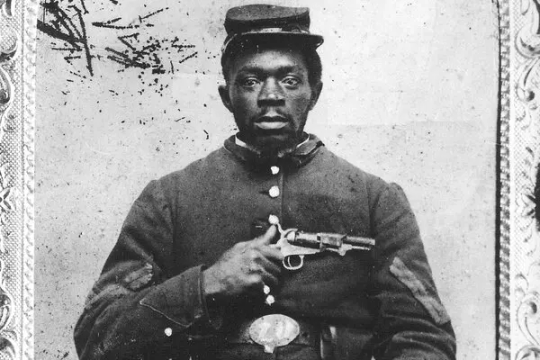
What happened to colored troops taken POW by Confederates in the Civil War?
Three-fifths of all African troops in the Union army were former slaves and those that fought in combat units did so at great risk to their lives (beyond the expected risks associated with combat). The Confederate government’s official position was that black POWs would be executed, reclaimed by their former masters or sold into slavery. Lincoln’s threats of reprisals helped minimize the impact of Confederate actions.
Details of the brutality African soldiers suffered are known, but with less specificity. We know of the multiple slaughters of surrendering or captured blacks that occurred. And, we know that armed Africans were the South’s worst nightmare as southerners were terrified that the example of these soldiers would “infect” the rest of the slave population and inspire them to take-up arms against their enslavers. In southern eyes, that alone warranted the harshest treatment for captured Africans.
What is clear is that these soldiers faced harsher and more cruel treatment at the hands of their captors than did their white counterparts. We know with clarity the physical violence that slaves suffered pre-war as well as after the war. Further, while 14% of Union prisoners died while being held as POWs and 11.8% of Confederate POWs died in northern captivity, historian Caroline Newhall notes that almost 35% of African POWs died in southern captivity. These data points converge with official Confederate statements and southern attitudes on slaves as property and provide strong evidence of the cruelty African Union soldiers faced.
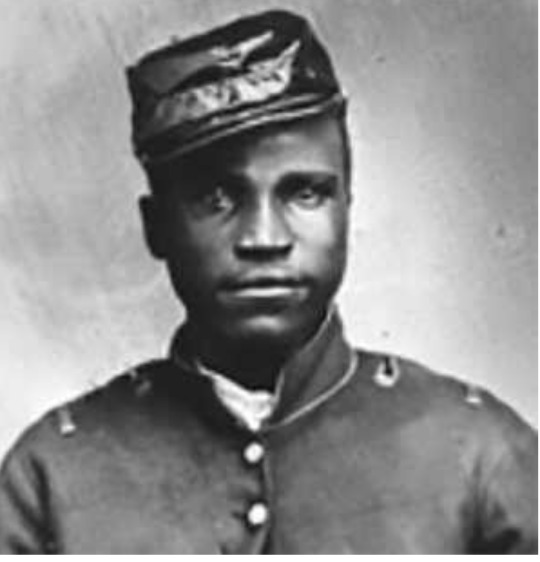
Cruelty and atrocities against African Union soldiers were not random acts of war, but were legislated and directed by the Confederate Congress and Jefferson Davis himself.
In late 1862, Davis stated: “All negro slaves captured in arms be at once delivered over to the executive authorities of the respective States to which they belong.” A resolution later adopted by the Confederate Congress provided that all “negroes or mulattoes,” slave or free, taken in arms should be tried for inciting servile insurrection and be subject to the death penalty.
In a letter to General Beauregard on this issue, The Confederate Secretary of War pointed out that "Slaves in flagrant rebellion are subject to death by the laws of every slave-holding State" but that "to guard, however, against possible abuse...the order of execution should be reposed in the general commanding the special locality of the capture."
Lincoln responded to this by threatening to retaliate against Confederate prisoners whenever African soldiers were killed or enslaved.
Davis publicly denounced Lincoln’s order; but, it did have — for the most part — the desired effect, as most African prisoners were not treated with the harsh justice mandated by Confederate policy, even though the Confederacy never officially acknowledged African-Americans as P.O.W.’s. Instead, what emerged were inconsistent practices in dealing with captured African American troops, depending on the time, place and the commander into whose hands they fell. Indeed, some Confederate officers encouraged the killing of African-American soldiers rather than taking them prisoner, and the atrocities committed against surrendering African soldiers at Poison Spring, Fort Pillow and Petersburg are now well known.
If not executed, captured African soldiers often found themselves treated very differently from white prisoners. Instead of being confined to camps, many African-American prisoners were put to forced labor.
As Robert Jones, a African soldier captured at Milliken’s Bend, La., recalled, “They took me to … Rust, Tex., where they … had me at work doing every kind of work, loading steamboats, rebuilding breastworks, while I was in captivity.”
Near Fort Gilmer, Va., captured African troops were forced to work under enemy fire in the trenches. In retaliation, the Union general Benjamin F. Butler placed an equal number of Confederate P.O.W.’s on forward trenches. Within a week, the African prisoners were removed from the front lines.
The sentiment that Africans under arms aroused -- along with the ingrained hostility of many Confederate soldiers -- set the stage for wartime atrocities. The most notorious incident occurred at a small Federal outpost north of Memphis, Tennessee, where Confederate cavalrymen under Nathan Bedford Forrest attacked Fort Pillow, which was garrisoned by about 500 troops.
More than half of the soldiers were African. The superior Confederate force overwhelmed the fort's defenders; Union casualties were high. But after the Federals surrendered, Forrest's men shot and killed a number of unarmed soldiers and officers, both black and white.
In October 1864 Saltville, Virginia, Confederate soldiers executed unarmed African prisoners, even raiding a hospital on two separate occasions and murdering wounded Africans in their sickbeds.
High casualty rates in combat were also common for African American units — usually for two reasons. First, since Africans had not previously served in the military, they were inexperienced fighters. Second, feeling social pressure to prove themselves as men, they often took risks on the battlefield that their white counterparts would not.
But, despite facing intense racism and humiliating treatment from their own white colleagues in arms, Africans excelled in combat, providing an additional, critical edge in manpower to what the Union already possessed.
One Union captain explained the significance of African military participation on the attitudes of many white soldiers. "A great many [white people]," he wrote, "have the idea that the entire Negro race are vastly their inferiors. A few weeks of calm unprejudiced life here would disabuse them, I think. I have a more elevated opinion of their abilities than I ever had before. I know that many of them are vastly the superiors of those...who would condemn them to a life of brutal degradation."
Of the 180,000 African Americans who fought for the Union, 37,300 died. More than 20 African Americans were awarded the Congressional Medal of Honor, the nation's most prestigious military decoration. Fourteen of those men earned their medals at Chaffin's Farm.
#african american#african#afrakan#kemetic dreams#brownskin#afrakans#brown skin#africans#african history#african american history#medal of honor#chaffin farm#military#military history
382 notes
·
View notes
Text
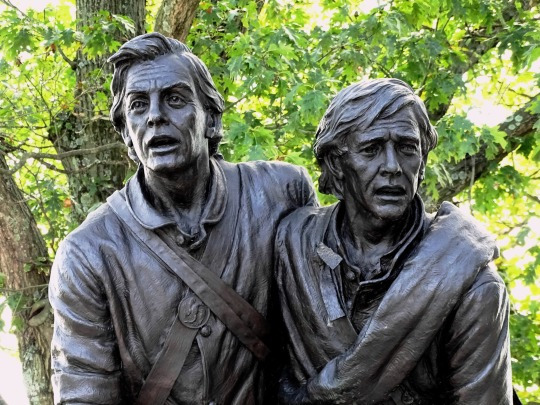
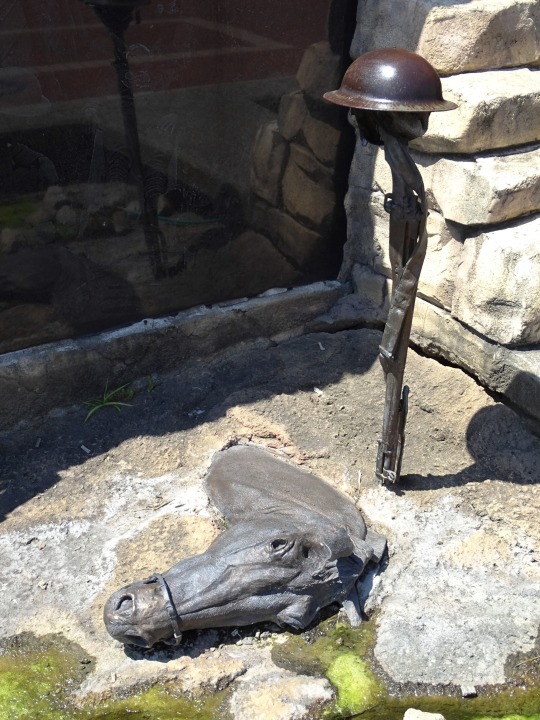
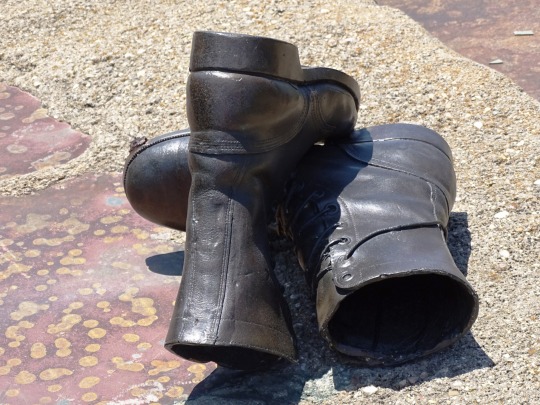


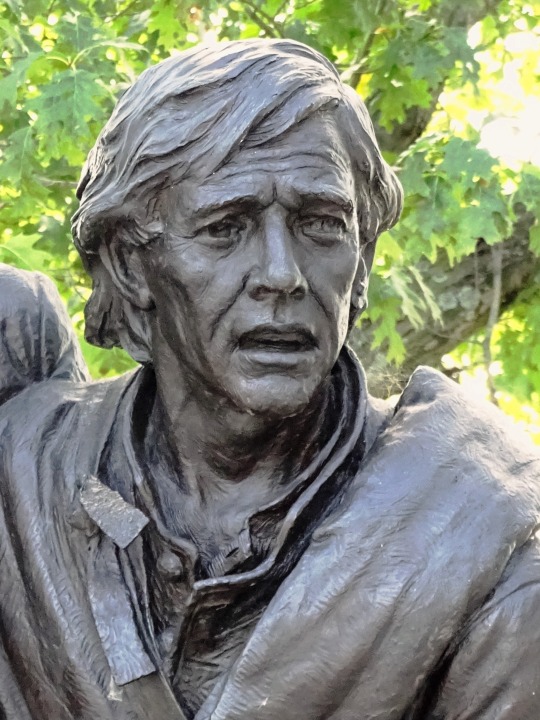

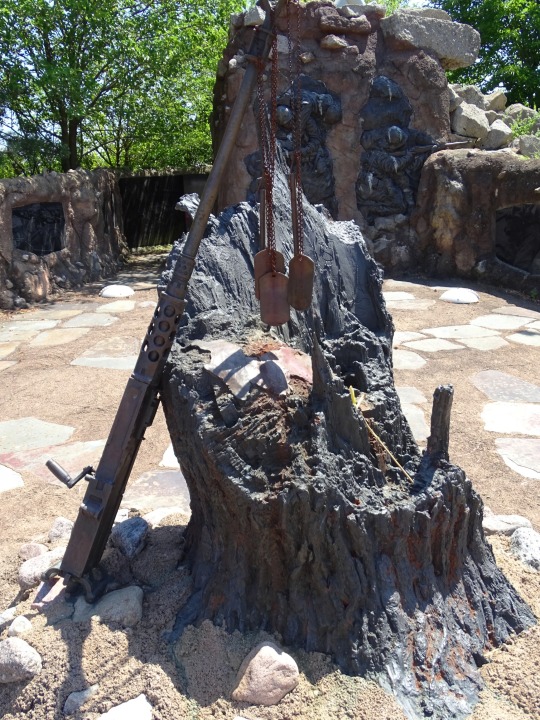
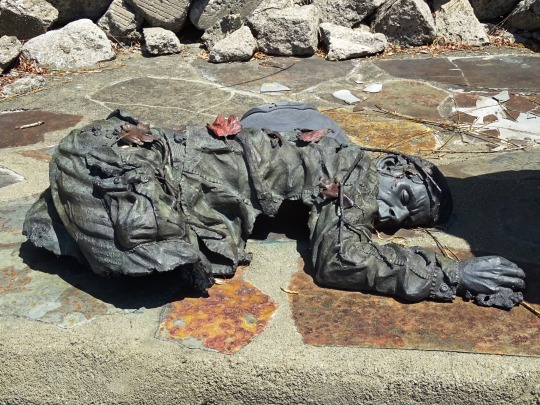
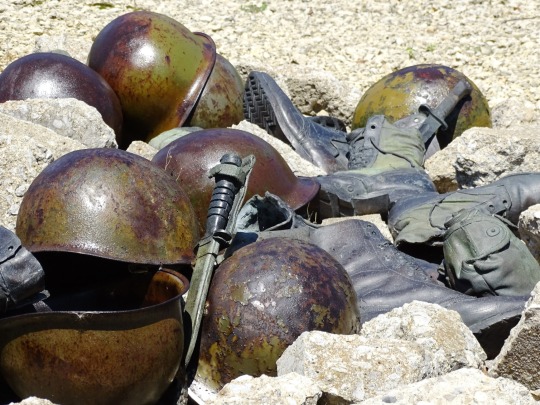
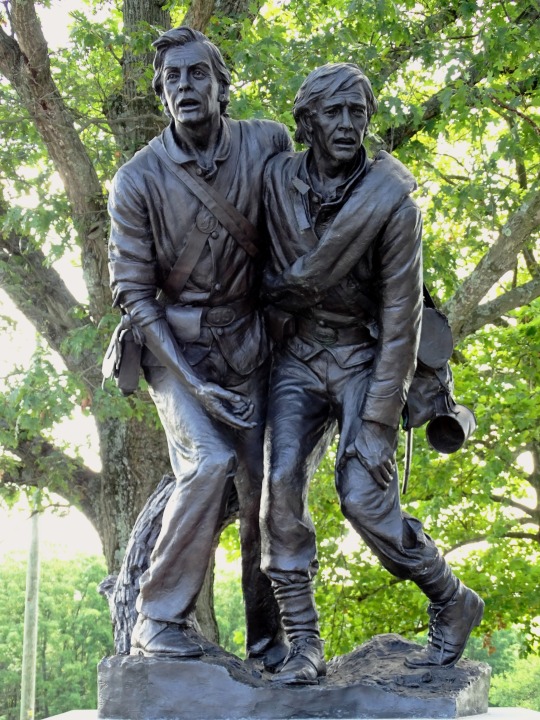
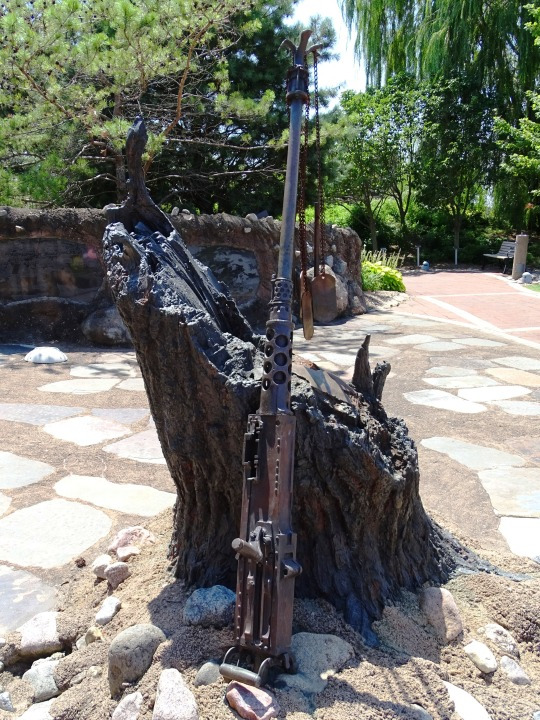
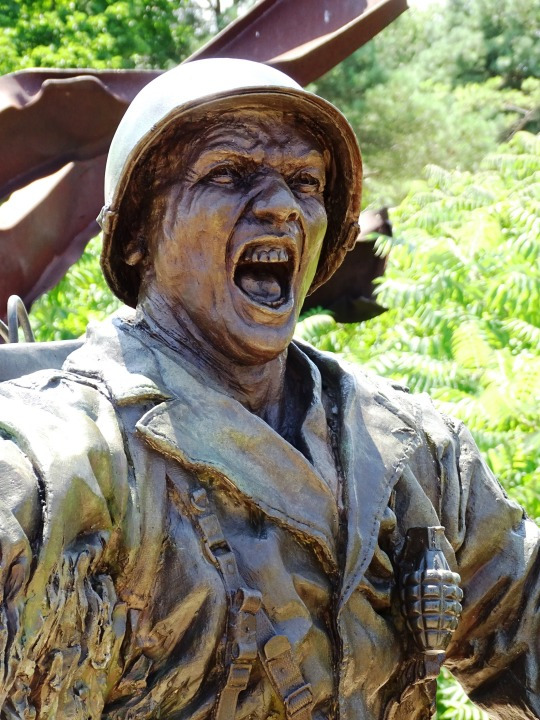
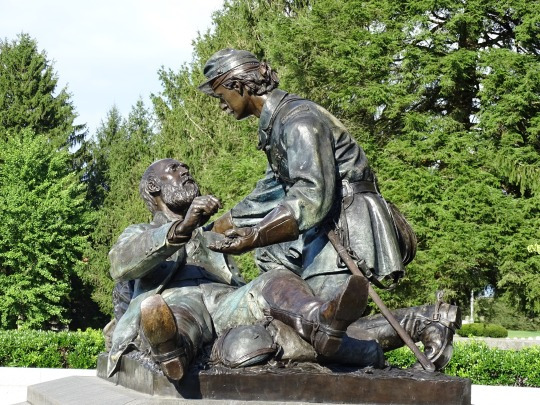
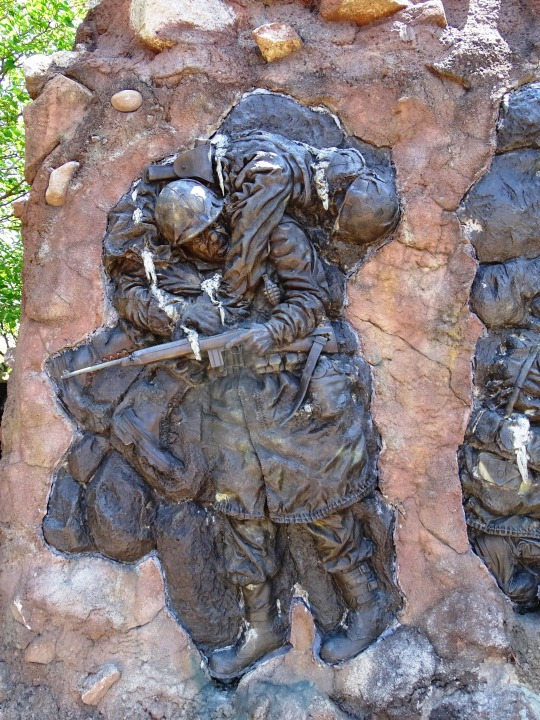

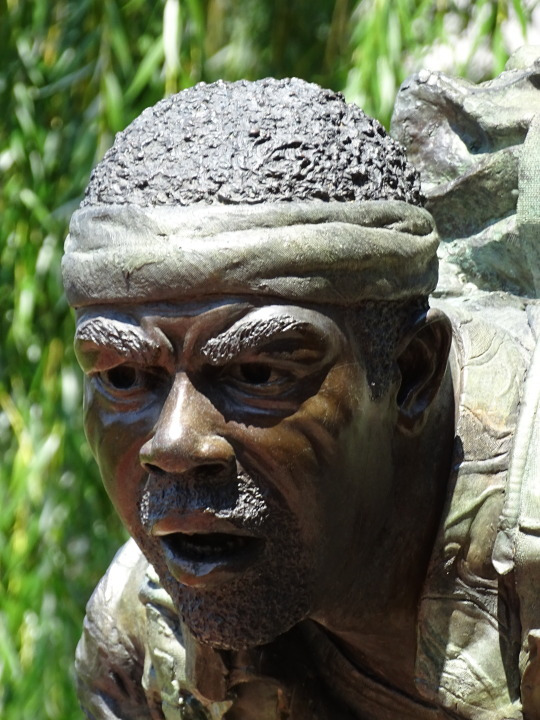
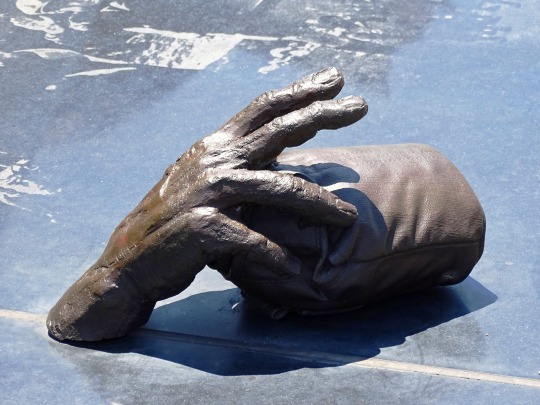
Memorial Day
Memorial Day on May 26 conjures images of hamburgers, hot dogs, swimming pools, and summertime for many Americans. But the last Monday in May serves, most importantly, as a time to honor those who died while fighting in the U.S. Armed Forces. It’s a holiday steeped in somber American history and tradition. The day actually began as “Decoration Day,” following the Civil War, when mourners placed flowers on the graves of Union and Confederate soldiers. Yes, Memorial Day has also come to signify the “unofficial” start of summer, but let’s remember the heroes who made it all possible.
When is Memorial Day 2026?
Men and women who’ve served and sacrificed their lives in the U.S. Armed Forces are honored on Memorial Day on May 26.
History of Memorial Day
The Civil War ended in the spring of 1865 when Robert E. Lee surrendered the last major Confederate army to Ulysses S. Grant at the Appomattox Court House on April 9. Over 620,000 soldiers died in the four-year conflict. General John A. Logan of the Grand Army of the Republic (an organization of Union veterans) would eventually select May 30, 1868, as a day to pay tribute to the fallen:
“The 30th of May, 1868, is designated for the purpose of strewing with flowers, or otherwise decorating the graves of comrades who died in defense of their country during the late rebellion, and whose bodies now lie in almost every city, village, and hamlet churchyard in the land…”
Logan apparently chose May 30 because flowers would be in bloom all over the country. By the end of the 19th century, Memorial Day ceremonies were being held on May 30 throughout the nation. States passed proclamations, and the Army and Navy adopted rules for proper observance at their facilities.
The crowd attending the first Memorial Day ceremony at Arlington National Cemetery was approximately the same size as those that attend today’s observance — about 5,000 people. Small American flags were placed on each grave — a tradition still followed at many national cemeteries today. In recent years, the custom has grown in many families to decorate the graves of all departed loved ones.
By 1890, each Northern state had made Decoration Day an official holiday. But this was not the case in the South, where states continued to honor their dead on separate days until after the First World War.
The May 30 date held for decades. But, in 1968, Congress passed the Uniform Monday Holiday Act, which established Memorial Day as the last Monday in May in order to create a three-day weekend for federal employees. The change took place in 1971. The same law also declared Memorial Day a federal holiday.
Memorial Day timeline
1864 Beginning of a Tradition
Women from Pennsylvania place flowers on the graves of fallen soldiers after the Battle of Gettysburg.
May 5, 1866 Birthplace of Memorial Day
Waterloo, New York, begins hosting an annual community service in remembrance of soldiers whose lives were lost.
May 5, 1868 It’s Official
Major General John A. Logan issues General Order No.11, making the day official.
2020 Virtual Solidarity
The organization American Veterans (AMVETS) holds a virtual motorcycle rally in honor of Memorial Day.
Traditions of the Day
Many Americans observe Memorial Day by visiting cemeteries or memorials, holding family gatherings, and participating in parades. It’s the three-day weekend that kicks off the summer season and the time for hanging out at the beach and lakes, and barbecuing with friends and family. But Memorial Day is also the most solemn American holiday — a day to remember those who made the ultimate sacrifice while defending their nation.
Towns and cities across the country host grand Memorial Day parades every year, often featuring senior veterans and military personnel. Some of the biggest parades take place in New York, Chicago, and Washington, D.C. Cemeteries and memorials are also visited by Americans, with some citizens wearing or holding red poppies to symbolize those who have fallen in war. This tradition has been around since World War I. Weekend trips and parties are also arranged to balance out the somberness of the day and welcome the summer.
By the Numbers
620,000 – the number of soldiers who died on both sides of the Civil War.
1868 – the year when President James Garfield delivered a very long speech on Memorial Day.
2500 – the number of motorcyclists who participated in the first Rolling Thunder rally.
$1.5 billion – the number of dollars typically spent on meat and seafood in preparation for Memorial Day weekend.
60% – the percentage of American households who attend or host a barbecue on this day.
1.5 million – the number of people who watch the National Memorial Day Parade.
900,000 – the number of people who gathered for the Rolling Thunder Memorial Day motorcycle rally in 2019.
260,000 – the number of graves at Arlington National Cemetery adorned with flags in 2019.
45 million – the number of men and women who have served in a time of war for the U.S.
3 P.M. – the time of day when a moment of silence is observed by Americans throughout the country on this day.
How to Observe Memorial Day
Pay your respects
Participate in the National Moment of Remembrance
Fly the flag
Lay flowers on the grave of a family member or friend who died while serving. If you don't personally know any fallen soldiers, visit a local cemetery anyway. After all, they made the ultimate sacrifice for you.
By doing so, you'll be joining millions of Americans in national unity to honor Memorial Day for what it truly is — a day to remember those who laid down their lives in service of their country and its citizens.
If you have an American flag at home, be sure to fly it at half-mast until noon, then raise it to full mast for the rest of the day. The practice of lowering and then raising the flag has been observed for over 100 years to symbolize America's persistence in the face of loss.
5 CREATIVE WAYS TO DECORATE FOR MEMORIAL DAY
Unfurl those flags
Line your walkway with mini flags
Red, white, and blue layered cake
Stars and Stripes windsocks
Symbolic flowers
Often people store their American flags and raise them only during patriotic holidays. This is definitely one of those days.
Nothing honors our deceased veterans like dozens (or even hundreds) of flags in your front lawn and entryway.
It’s a decoration you can eat.
It’s festive, fun, and patriotic. Need we say more?
Even if you haven’t lost a loved one who served in the military, you can still honor the fallen with flowers at home. Red, navy, and blue dahlias combined with white rose silk flowers can make a stunning visual combination.
Source
#Maryland State Monument by Lawrence Monroe Ludtke#original photography#Gettysburg National Military Park#Community Veterans Memorial#Munster#Indiana#Pennsylvania#Europe Monument#Pacific Monument#Omri Amrany#A Soldier's Sacrifice by Julie Rotblatt-Amrany#Vietnam Veterans Memorial by Maya Lin#Washington DC#summer 2019#2009#free admission#tourist attraction#landmark#cityscape#Memorial Day#26 May 2025#last Monday in May#MemorialDay#travel#USA#vacation#Friend to Friend Masonic Memorial
7 notes
·
View notes
Text
Tentative Announcement!
Tentative because my spring semester hasn’t started yet, so I may be slightly underestimating my workload in the coming weeks (or overestimating it, you never know). But as of this moment, it is my intention to publish The Stories in Our Veins in daily installments throughout the month of February, beginning with the first and ending with the twenty-ninth (as good a day as any, Johnny).
Keep your eyes out for more teasers and updates throughout the month of January! For now, here is a preview of the fic description to whet your appetite 🍷
You hold in your hands a leather-bound book inscribed with the title The Stories in Our Veins. No author is named by the cover. On the first page, the following passage has been written in an elegant, cursive hand: A confederate who foresees your conclusions and course of action is always dangerous, but one to whom each development comes as a perpetual surprise, and to whom the future is always a closed book, is indeed an ideal helpmate. Sherlock Holmes in “The Adventure of the Blanched Soldier,” written by Sir Arthur Conan Doyle in 1926.
#rebs blogging#the stories in our veins#tsiov#i commissioned a cover a few months ago and i am in love with it I can't wait to show it to you!!!!!!#(along with the story obviously)
73 notes
·
View notes
Text



Natural Falls State Park: Oklahoma’s Hidden Waterfall Gem
Tucked away in the Ozark Highlands just west of West Siloam Springs, Oklahoma, Natural Falls State Park spans a modest 120 acres yet packs a powerful scenic punch. Here’s why this park deserves a spot on your bucket list:
🌊 Majestic Waterfall
At the heart of the park is a stunning 77-foot waterfall, cascading into an emerald pool nestled within a V-shaped valley. This dramatic drop is tied for Oklahoma’s tallest waterfall—and a cousin to Turner Falls—making it a breathtaking sight year-round. The state even pumps water to the top during dryer spells to keep the cascade flowing.
📜 Rich History & Pop Culture
Once privately known as Dripping Springs, the site was a popular roadside retreat until Oklahoma purchased the land in 1990 and renamed it Natural Falls. Fun fact: the area served as a filming location for the beloved 1974 movie Where the Red Fern Grows. Long before that, Native American tribes—and later Union and Confederate soldiers—found solace around these springs.
🎯 Access & Amenities
Easily reachable: Just 6 miles west off Hwy 412, with ADA-compliant paths from the parking lot to the top overlook . A second observation deck with seating lies at the base of the falls.
Modern conveniences: The park has RV and tent campsites (44 RVs, 27 tents), plus 5 yurts—complete with AC/heat, microwave, fridge, coffee maker, and deck—for a cozy “glamping” experience.
Activities for all: Explore hiking trails (around 3.5 miles total), disc golf, fishing (catch and release), playgrounds, volleyball, horseshoes, basketball, and picnic spots.
🌿 Flora & Fauna
The misty falls create a microclimate ideal for ferns, mosses, and liverworts—over 18 fern species thrive here . In the wider woods, expect a rich mix: maples, oaks, hickory, dogwood, sassafras, pawpaw, redbud, and spicebush populate the lush forest floor.
🛠️ Visitor Tips
Entrance fee: $10 per vehicle (Oklahoma residents $8) with annual and multi-day passes available. Veterans and seniors may be waived.
Hours: Daily from daylight until dusk, with the office/gift shop running from 8:30 am to 5 pm.
No swimming: To protect the ecosystem, water access is limited to viewing platforms.
Best hike for families: The waterfall trail is a quick, manageable hike—mostly paved and stroller/wheelchair friendly. For a loop, mix in Fox Den, Ghost Coon, Pine Ridge, or Bear trails; bring a trail map or use AllTrails—some are less maintained.
🧳 Planning Your Visit
1. Pack right: Bring layered clothing, sturdy shoes, water, and snacks.
2. Book ahead: Reserve campsites or yurts online—these fill up fast, especially on weekends.
3. Support conservation: Entry fees help fund park maintenance and protect native life.
4. Explore nearby: West Siloam Springs lies just 6 miles away and is a great base if you want to combine this with a trip to Strange Brew or the Cherokee Casino.
📣 Final Thoughts
Natural Falls State Park may be small, but it delivers big on experience: a towering waterfall, scenic forest trails, modern camping with a glamping twist, and a slice of living history. Whether you're chasing waterfalls, glamping in a yurt, or enjoying a peaceful afternoon among ferns and forest, this is a staple for anyone exploring Oklahoma’s hidden outdoors.
So next time you're in the Tulsa area or cruising through northeastern Oklahoma, take the short detour to West Siloam Springs—you won’t regret it.
Quick Info:
Location: 19225 E 578 Rd, Colcord, OK (on US 412, 6 miles west of West Siloam Springs)
Entrance Fee: $10/vehicle ($8 OK residents); veterans & seniors waived.
Open Daily Daylight–dusk; office 8:30 am–5 pm year-round
Campsites & Yurts: 44 RV, 27 tent, plus 5 furnished yurts.
Top Activities : Waterfall viewing, hiking, disc golf, picnics, playgrounds, fishing, group functions.
6 notes
·
View notes
Note
Maybe it's already been said but: what caused the ecological cataclysm?
You mean the Ecocide in the Biopunk universe?
It was a biological world war, but it was much more sophisticated that we now imagine such things, it wasn't just diseases to humans and crops spread by dumb bombs. It was completely autonomous, self-evolving ecosystems that could target not only soldiers, but select fortifications, equipment (steel eating corrosive bacteria can nest in warships and eat holes on them within minutes), communication networks (this is why the internet is so fucked up and most equipment resemble brickphones), food supplies, and yes, eventually the population and the ecosystems of entire countries and continents, should it be needed, for strategic reasons of course.
The militaries of the nations involved said that this was the future of war, since it was self-evolving, targeted and could be controlled through biological means. It very obviously was not the case. Autonomous combat ecosystems spread through spores through wind all over the world. Fungal towers spread over mountains and seas, trees of death grew with cursed pollen. The so called "Third World War" was quickly interrupted by the Ecocide, the worst crime of humankind.
During the Dead Spring of 2114, there was a real fear that Earth's biosphere could be completely annihilated. The neutral nations, in the Alliance for the Salvation of the Biosphere, mobilized the entire planet. The disputes that started the war didn't matter anymore. Even previous pandemic scares could not compare to what happened here. Armies in hazmat suits went from world capitals to the most remote places of the world to immunize whole ecosystems, entire cities were abandoned and millions forced into refuges for the sick built in mere months. The entire economy was not nationalized, but internationalized for the "war" effort, and many key industries were kept like that decades after.
What followed was the "Traumatic Decade", a time of recovery. After the war, the architects of the bioweapons and their commanders were condemned as "hostis terra", enemies of Earth. Entire nations still live hand-to-mouth from the reformed UN, which keeps the world's militaries and economies in a sort of confederation designed to prevent another Ecocide from ever happening again, with the strictest measures possible. You disagree? One Ecocide was enough. We won't tolerate another one.
This was the world where Marcos y compañía were born. Though they may not remember much of it. As the Blue Helmets marched through Washington pulling the designers of deadly strands of pollen out of their bunkers, Marcos was busy learning how to say "mamá".
(Though the war started in the Northern Hemisphere and probably between the remnants of NATO and the Sino-Russian alliance, I leave deliberately ambiguous who "shot first". In the narrative, it's supposed to be brutal, devastating, and utterly pointless, yet world changing on its consequence, like the First World War)
15 notes
·
View notes
Text










A (late) state of the garden, part 1!
After a very terrible year thanks to frost, the perennials seem to be coming back with a vengeance. The encore azaleas in the front bloomed for what felt like ever, and the viburnum I planted last year seems to be overjoyed in its current location. I'm considering going back to get two more for the same place, since it's a little bare. (The red camellia I bought at the same time died hard over the winter, tragically.) The golden azalea Mom planted the year I moved in has also done well; after six years it's finally getting some real body to it!
The pink azaleas next to the house and my neighbor's massive Japanese privet both also had good years; I set up a patio table and chairs where the privet overflows my fence so I could sit out there some mornings with coffee and just bask in the smell.
Mom planted several heritage irises in the front a few years ago, and this year I got my first very purple bloom! Neither she nor I could remember what color they were, ahaha. Hoping for more blooms next year.
The confederate jasmine I planted last spring has done incredibly well and is trellising wildly over the fence. I planted a honeysuckle vine in the left corner next to it at the same time, but that thing looks worse than a weed & I'm considering tearing it out.
Finally, all four trees in the backyard are doing well. Two years ago, I sourced and planted two Shumard oaks myself, start to finish. They both did pretty badly & one had bad root girdling, so last year I asked a different company to come out (no way I was digging more of those holes myself, thanks), replace one of the oaks, move one of the current oaks to a different spot, and add a fresh oak & a magnolia in the back corner to eventually provide some privacy for my backyard neighbors. All four trees are doing great, even the relocated Shumard, and the magnolia even managed half a dozen blooms this year, which I completely forgot somehow that magnolias did and which literally made me shout when I first saw them. Here's hoping they put on some major height and body this summer!
#quark's gardening tag#i'm doing this rather than coming up with a summary and title for the next oneshot#after this long you'd think that'd be easier#well#it AIN'T#quark rambles
27 notes
·
View notes
Text


„A Swiss in the Desert“ could read a future biography of architect Albert Frey: born and trained in the Confederation, Frey in 1930 emigrated to the United States and after an interlude in New York permanently settled in Palm Springs. Between 1928 and his emigration Frey had worked in the office of Le Corbusier, among others on the Villa Savoye project, and eventually became the first LC disciple in the US. With this record in his luggage Frey was able to join architect Lawrence Kocher, at the same time managing editor of Architectural Record, together with whom he designed the famous Aluminaire House in 1931.
A commission from Kocher’s brother eventually decided his fate to settle in Palm Springs permanently: while designing the Kocher-Samson Building in 1934 Frey fell in love with Palm Springs and the mountainous desert landscape in particular. During the more than sixty years that would follow, Frey, in changing collaborative constellations, designed a great number of buildings in Palm Springs, ranging from the Palm Springs City Hall (1952) to the Palm Springs Aerial Tramway Valley Station (1963) and numerous residences including his own two houses. But while his early Aluminaire House still shows the Corbusian influence Frey eventually coined his very own interpretation of the International Style in the desert, steering clear of any kitschiness that is sometimes associated with Palm Springs architecture. Instead, his architecture is characterized by a sophisticated simplicity that derives from his life-long concern with low-cost housing, his interest in materials and also his deep-rooted convictions about good architecture.
Up until August 18 the Palm Springs Art Museum shows the comprehensive exhibition „Albert Frey: Inventive Modernist“, curated by Brad Dunning who is also the editor of the present accompanying catalogue. It contains a wealth of photographs, plans and drawings as well as numerous and very insightful essays by renowned authors like Joseph Rosa, Barbara Lamprecht and Michael Rotondi. The result is a truly comprehensive overview of both Frey’s work and life that also is beautifully designed and as such deserves glowing praise!
16 notes
·
View notes